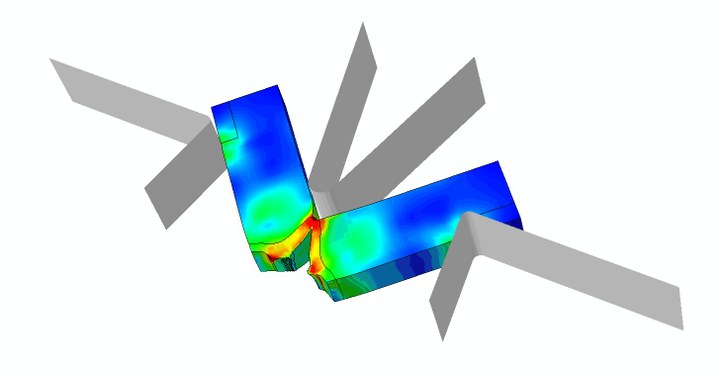Dynamic Fracture Behaviour of Pipeline Steels
The occurrence of a longitudinal crack propagating along a high pressure gas pipeline is a catastrophic event, which involves both economic losses and environmental damage. Hence, the fracture propagation control is essential to ensure pipeline integrity. Modern fracture control strategies for high pressure pipelines rely on numerical simulations of ductile crack propagations and arrest. The numerical material models are informed by toughness tests such as Charpy V-notch (CVN) experiments and Battelle Drop Weight Tear Tests (BDWTT).
The constitutive behaviour of the sound pipeline steel is often modelled as merely an elastoplastic law, measured under quasi-static conditions. However, both Charpy experiments and Battelle tests are dynamic events, which require knowledge of the strain rate sensitivity of the pipeline material. In addition, very high strain rates can occur in the vicinity of a running crack in a high pressure gas pipeline. Hence, the constitutive material model for the pipeline steel has to account for strain rate sensitivity.
In recent years, DyMaLab has supported steel suppliers, pipe mills and oil & gas majors in the safe and reliable design of pipelines by
- Performing Hopkinson tests on high strength X70 pipeline steels subjected to high strain rates (up to 1000 s-1) and low temperatures (down to -70oC)
- Evaluating the influence of stress triaxiality on the dynamic fracture behaviour of pipeline steels using notched Hopkinson samples
- Implementing enhanced material models to capture the dynamic response of modern pipeline steels during Charpy and Battelle tests
- Assessing the effect of strain rate sensitivity on the behaviour of subsea pipelines subjected to underwater explosions
Research Projects
- TOOLKIT: Toolkit for the Design of Damage Tolerant Microstructures (2016-2019).
European RFCS Project including high strain rate testing of X70 pipeline steel and numerical modelling of the Battelle Drop Weight Tear Test (BDWTT).
Key publications
- Chandran S., Verleysen P., Lian J., Liu W., Cooreman S. and Münstermann S., Dynamic Fracture Behaviour of High Strength Pipeline Steel, Procedia Engineering, vol. 197, pp. 214-223 (2017)
- Van den Abeele F. and Verleysen P., Finite Element Analysis of Subsea Pipelines Subjected to Underwater Explosion, Proceedings of the ASME 32nd Conference on Ocean, Offshore and Arctic Engineering, OMAE2013-10736 (2013)
- Van den Abeele F., Peirs J., Verleysen P., Oikonomides F. and Van Wittenberghe J., Dynamic Behaviour of High Strength Pipeline Steel, Proceedings of the ASME 9th International Pipeline Conference, IPC2012-90224 (2012)
